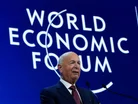Davos 2025: Prioritising Climate Adaptation & Biodiversity

With global leaders having departed the World Economic Forum (WEF) in Davos, Stuart Lemmon, CEO of EcoAct and Global Head of Practices at Schneider Electric Sustainability Business, has highlighted the urgency of expanding the climate agenda.
"While geopolitics, AI and world trade dominate the stage, placing equal focus on climate adaptation, biodiversity financing and resilience building are essential to addressing today’s most pressing challenges," Lemmon wrote in an open letter.
"These issues are not just complementary—they are critical to ensuring global stability and prosperity."
Here’s an in-depth look at Stuart Lemmon’s message and its implications for global action.
A system under pressure
Stuart’s letter to the WEF begins with a stark reality check: the climate crisis is no longer a distant threat but a present danger.
"According to the CDP Corporate Health Check, only 10% of companies effectively integrate climate considerations into their strategies," he notes. The gap could have devastating consequences, with climate inaction projected to reduce global GDP by 18% by 2050.
Biodiversity loss further poses significant risks. The WEF’s Future of Nature and Business report estimates that transitioning to a nature-positive economy could unlock US$10.1tn annually. Yet, biodiversity financing remains underfunded, with limited public and private sector investment to address this critical issue.
Resilience as a growth enabler
Contrary to misconceptions, Stuart argues that resilience and adaptation are not barriers to growth but essential drivers.
"Resilience and adaptation are growth enablers," he emphasises. Businesses and governments adopting these principles will unlock opportunities and create competitive advantages.
Examples like the Finance for Biodiversity Pledge, which commits signatories to advancing sustainable practices, highlight progress within the financial sector. However, scaling these efforts globally requires stronger leadership and collaboration.
A clear business case for action
The business case for sustainability is compelling. Financial markets increasingly reward companies with robust climate strategies, positioning them as better long-term investments.
"This shift in capital flows is catalysing transformation across industries, creating competitive advantages for early movers," Stuart continues.
Companies that adopt science-based targets and prioritise emissions reduction are already seeing results. Transitioning to resilient, climate-conscious operations isn’t just a moral imperative—it’s a strategic necessity.
Broadening the post-Davos dialogue
Stuart critiques Davos for missing an opportunity to prioritise interconnected challenges like climate adaptation, biodiversity financing and resilience building.
"Davos must serve as a bridge between public and private sectors, championing actionable frameworks for resilience against extreme weather events, rising sea levels and water scarcity," he urges.
He calls for increased investment in nature-based solutions, highlighting that resilience extends beyond infrastructure to encompass financial systems, supply chains and human capital.
Integrating climate into global discussions
Stuart advocates for a stronger focus on these issues in upcoming global events, particularly COP30.
"The integration of adaptation, biodiversity and resilience into global economic discussions is not optional—it is essential," he asserts.
He goes on to challenge global leaders, policymakers and businesses to elevate these topics alongside trade, technology and geopolitics, driving collaborative strategies and unlocking dedicated investments.
Stuart's letter illistrates a pivotal moment for global leaders, businesses and the financial sector to work together.
"We urge you to make these issues a priority in all future discussions," he concludes. "Together, we can shape a future where business leadership and innovation converge to create lasting value."
As the world prepares for COP30 and beyond, the message is clear: addressing climate adaptation, biodiversity financing and resilience building is critical to ensuring long-term global stability and prosperity.
Broadening the dialogue post-Davos
Davos missed a crucial opportunity to address the interconnected challenges of climate adaptation, biodiversity financing and climate resilience – issues uniquely suited to its role as a bridge between public and private sectors.
Beyond mitigating emissions, actionable frameworks for strengthening global resilience to extreme weather events, rising sea levels and water scarcity are urgently needed.
Investment in nature-based solutions remains woefully inadequate and policymakers alongside private-sector leaders must prioritise unlocking capital for protecting and restoring ecosystems.
Resilience extends beyond infrastructure to financial systems, supply chains and human capital; embedding it into strategies is essential for businesses and governments alike.
The economic implications of adaptation, biodiversity financing and resilience building cannot be overstated. These are not issues to be relegated to the sidelines while other topics dominate the agenda.
As we look toward COP30, the global community must demand better. The integration of adaptation, biodiversity and resilience into global economic discussions is not optional – it is essential.
This is a collective opportunity where every organisation can make an impact, working together to safeguard both economic and business stability.
We urge you to make these issues a priority in all future discussions. Ensure that platforms like Davos champion actionable frameworks, dedicated investments and collaborative strategies that drive climate adaptation and biodiversity financing forward.
Elevating these topics to the same level as trade, technology and geopolitics is vital for safeguarding both economic prosperity and long-term business resilience.
Together, we can shape a future where business leadership and innovation converge to create lasting value.
Make sure you check out the latest industry news and insights at Scope 3 Magazine and be part of the conversation at our global conference series, Sustainability LIVE and Procurement & Supply Chain LIVE.
Discover all our upcoming events and secure your tickets today. Subscribe to the Scope 3 Magazine newsletter.
Scope 3 Magazine is a BizClik brand.
- Maersk Sustainability Reporting: Navigating Scope 3Transportation & Logistics
- SHEIN’s Scope 3 Emissions: Fast Fashion’s Carbon BurdenCircular Economy
- Tackling Super Bowl LIX's Scope 3 Emissions ChallengeScope 1 2 and 3
- NetApp’s SBTi Validation Marks Sustainability MilestoneScope 1 2 and 3

